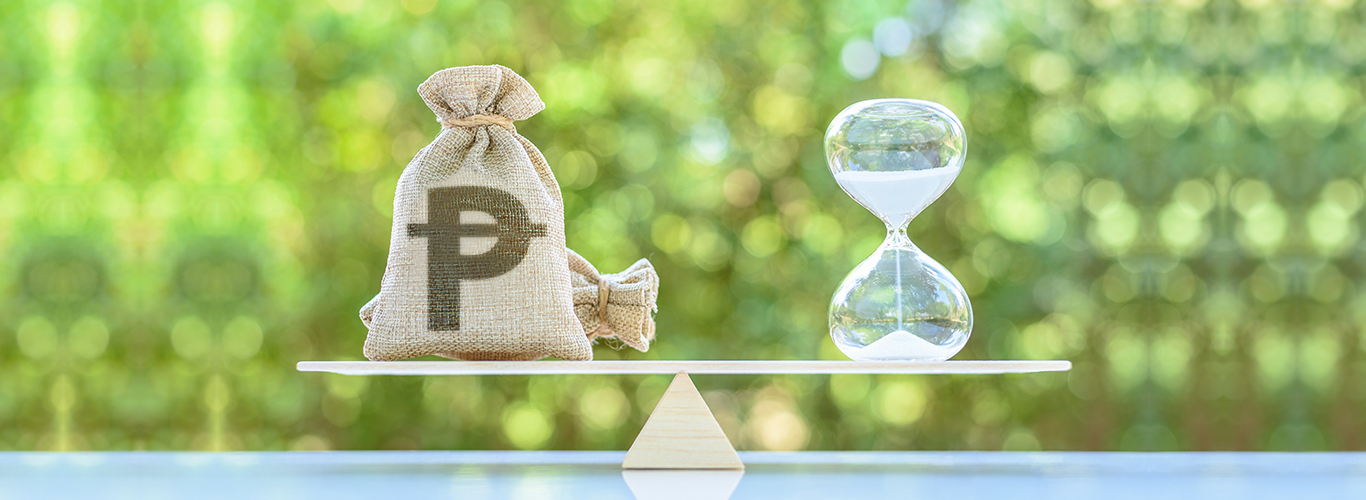Managing Money | Money Basics
Time value of money: What is it and what is its role in personal finance?

One of the most important concepts in finance is the time value of money. Many of our financial decisions rely on this concept. You experience the importance of the time value of money when you compute how much interest you will pay upon the maturity of your loan. The same goes for computing how much money you’ll need to save for retirement.
The time value of money is a useful tool that can help you make smart financial decisions.
What is time value of money?
The time value of money is based on the premise that money today is worth more than the same amount of money in the future. This is because money in the present can be invested in something and grow, while money in the future cannot because we still don’t have access to it.
Time value of money is important because of its use in a variety of financial decisions, such as investment planning, retirement planning, and mortgage payments.
How is the time value of money related to opportunity cost?
The time value of money is related to opportunity cost. Opportunity cost is the possible benefit that a person loses when choosing one option over the other. For example, if you buy a car, you may miss out on the opportunity to pay for a new condo’s downpayment.
The time value of money is important because it can help you make decisions about how to best use your money. Should you invest it, save it, or spend it? By understanding the time value of money, you can make the most informed decision possible.
How do you compute the time value of money?
There are a few methods to compute for the time value of money, but the most common is the present value formula. This formula takes into account the interest rate and the number of periods (years) until you get your money back.
Time value of money’s formula
You can calculate the future value of money by using this formula:
Present value x Interest rate x Time (a.k.a. Number of years in term) = Future Value
Since the interest is given annually, it is counted as 1 (once a year). If interest is given semi-annually, it becomes 2> Quarterly is 4, and monthly is 12.
To illustrate, here's an example:
Let’s say you invest PHP 100,000 (PV) for one year (n) at 10% interest compounded annually. The future value (FV) of that money is:
FV = PHP 100,000 x [1 + (10% / 1)] ^ (1 x 1) = PHP 110,000
You can adjust the formula to find the value of the future sum in present-day pesos. For instance, the present-day peso amount compounded annually at 7% interest that would be worth PHP 50,000 in one year is:
PV = PHP 50,000 / [1 + (7% / 1)] ^ (1 x 1) = PHP 46,730
What is the importance of time value of money in investing?
The time value of money is important in investing because it can help you in finding the right investment. If you’re deciding between different fixed-income securities, you can use the concept of time value of money to determine where your money can grow the most.
Although its interest rate is lower, a bond with 6.5% and a term of 7 years is a better investment than a bond with 8% and a term of 10 years, if you are looking to use the money right away. This is because you get to use the earned interest sooner in the former bond option, allowing you to re-invest it and let it grow even more.
What roles does the time value of money play in finance?
The time value of money can also be used to decide on a strategy for how to invest for retirement, mortgage payments, and insurance.
-
Retirement planning
Using the time value of money, you can compute how much money you’ll need to cover your living expenses and maintain your current lifestyle. You can determine how much your current savings will be worth in the future, when you finally retire, so you’ll know if it will be sufficient. For example, if you’re building a retirement fund of PHP 5,000,000 in the span of 20 years, you need to invest PHP 2,512,815.21 in a vehicle that earns 3.5% annually.
-
Loan payments
The time value of money can help determine how much exactly you’ll be paying toward your loan after a few years. Essentially, the sooner you pay off your loan, the less interest you will have to pay overall.
-
Purchasing Power
The time value of money also affects our purchasing habits. The time value of money helps us understand how inflation affects the purchasing power of money and thus, informs us how to spend money wisely. When inflation goes up, you end up paying more for the same items or services so that your PHP 100 in 2024 doesn’t have the same purchasing power as it did in 2000.
Are you ready to maximize your money’s worth?
Understanding the time value of money and its importance can prove beneficial in empowering you to get the most out of your money and achieve your financial goals. You can use this concept to determine your budget, choose the right loans, and, of course, invest your money in the right vehicles.
Be a well-informed investor with Metrobank.
More Smart Reads